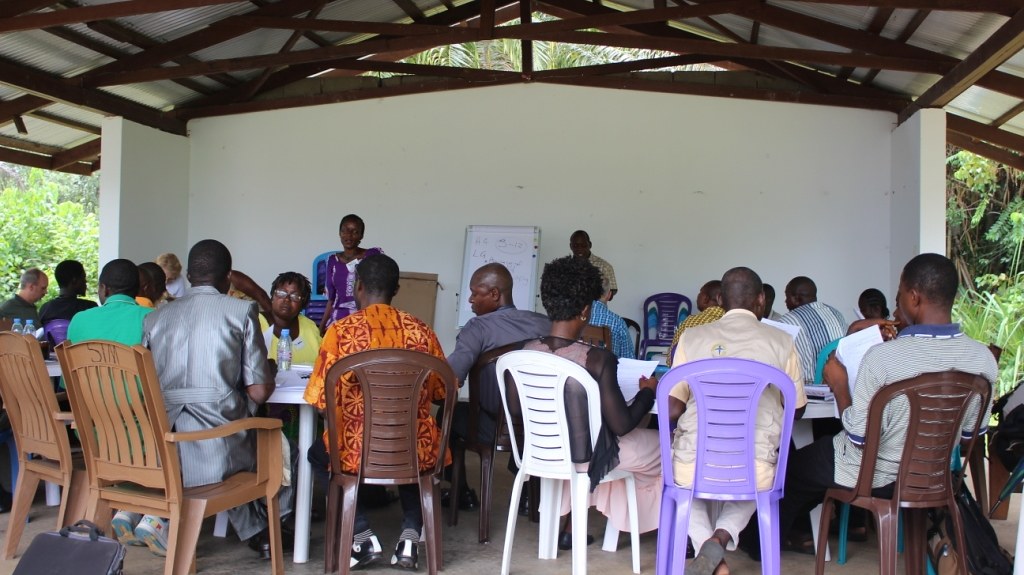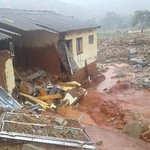Two years later, Liberians find healing from Ebolas emotional scars
By Debbie Sacra | Liberia in West Africa

In January 2016, the World Health Organization announced that the Ebola epidemic in West Africa was over. In reality, the crisis is far from over for many who were caught up in the worst of it.
How do you carry on when you alone survived out of 25 family members? Or when you lost your fiance, your baby, your parents and six of your seven sisters? Or when you can't even return to your own house because the sorrow is overwhelming? How do you carry on when you lost your wife and four sons and people in your community accuse you of purposefully killing them with the disease?
These are some of the stories people tell when they come to the Ebola Survivors' Clinic at ELWA Hospital. Their emotional pain is compounded by ongoing physical side effects of Ebola: cloudy or obstructed vision, swelling in their joints, deafness, numbness in their legs or general muscle weakness. These symptoms have made it difficult for some to return to their jobs, schools, or market businesses.
It has been well over a year since most of the survivors tested negative for Ebola and yet, they are only now realizing their health problems are not resolving. Thankfully, SIM donors have made it possible for these survivors to receive medical care free of charge.
In the aftermath of the Ebola epidemic, long-standing SIM ministries in Liberia have provided multiple opportunities for physical and emotional support to those who experienced loss and grief.
As the worst of the epidemic subsided, the Evangelical Church of Liberia (ECOL) leaders began reporting the emotional impact in their communities. As a result, friends of SIM Liberia started planning a program to provide psychological and spiritual healing.
Finding emotional healing
Though the Ebola epidemic will be remembered as a horrible chapter in history, it was just the latest crisis following the years of civil war that shook the nation from 1989-2003. With this backdrop of grief, ECOL and SIM worked with The American Bible Society to adapt their program, Healing the Wounds of Trauma, for the Liberian context.
In July 2015, five trainers came to Liberia to lead the inaugural Trauma Healing Workshops, including SIM missionary Nancy Writebol, a survivor of Ebola herself. Eighty Liberians in all participated, including spiritual leaders from ECOL churches, ELWA ministries, Samaritan's Purse and other ministries. Together they began their own Trauma Healing journeys and learned to facilitate similar groups in their churches and communities.
All patients in the Ebola Survivors' Clinic are offered the opportunity to attend a survivors' trauma healing group for free. There is also a growing awareness of the trauma experienced by healthcare workers who cared for Ebola patients in the Treatment Units, and others who served in some of the most difficult roles during the crisis.
Many Liberians say the trauma healing workshops have given them a new perspective on the emotions they experience. ECOL pastor Jeremiah Kollie finds that the lessons provide an opportunity for men to talk openly about their emotions in a way he has never seen before. They now understand that painful emotions are normal and do not mean they lack faith.
Other participants in the workshop have said they understand how to talk to people about their problems because of the program. The women's leader of ECOL, who has led three groups in her own village church, feels learning about the grief process has been incredibly helpful to the participants. The workshop encouraged them to think about moving forward in their healing journey, resolving not to give up and die in the "village of anger", instead leaving it behind so they might reach the "village of hope."
To expand the scope of the workshops, 10 radio dramas set in a Liberian context were created and broadcast on ELWA radio. After they aired, ECOL president Rev Moses Paye, reviewed principles of the trauma healing workshops and took phone calls on the air.
The Ebola Erasers
In January 2016, a group of ECOL pastors and SIM missionaries reached out to a group of workers of the Ebola crisis who were perhaps the most unappreciated, and the most stigmatized - the men who cremated the bodies of Ebola victims. Cremation is anathema in Liberian culture: the dead body of a family member is treated respectfully and buried with honor and dignity. But at the height of the crisis, quickly removing the Ebola-infected bodies of the deceased from their community became a requirement to end the epidemic.
Unable to coordinate safe burials when hundreds were dying every day, the government ordered the bodies to be burned. Subsequently, the workers assigned to this task have been ostracized from their homes and communities, rejected by their families and even spouses, and completely abandoned by those who ordered them to carry out this culturally onerous task.
After hearing about the rejection these cremation teams were experiencing, ECOL and SIM leadership invited them to share a meal with the pastors and missionaries at ELWA. Some said through tears that this was one of only a few times anyone had come close to them, or was willing to share food with them post-Ebola. They expressed a desire to take part in a trauma healing workshop and this counseling is ongoing.
On the second Wednesday of March, Liberians commemorate "Decoration Day" in which they clean and place wreaths on the graves of loved ones. For some, this was the first year they were able to visit the graves of those lost in the Ebola epidemic, if in fact they know where their family members are buried at all. The man in the survivors' clinic who lost his wife and four sons returned to his family's gravesite for the first time.
For a number of Liberians taking the trip to gravesites, it was a journey full of sorrow. And for people in Liberia in the wake of multiple historic disasters, life is still a burden, emotionally and physically. But like many, he is also attempting to walk the path of healing and hope, though the way ahead is uncertain.
______________________________________________________________
For more information how you can help the people of Liberia, please go here.
Related stories

Uruguay immigrants are putting down New Roots Duplicate 1
Uruguay has a large immigrant population, and students from the vocational programme at the Biblical Seminary of Uruguay, a partner of SIM, realised many foreigners were finding it difficult to adjust to their new home. New Roots ministry was formed to assist these newcomers!
Zimbabwe new stories 2 only en-gb
Short Summary
Zimbabwe new stories
short summary

